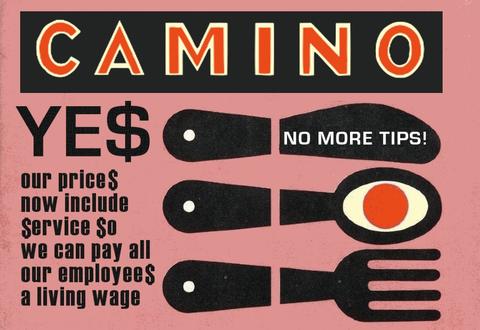Why Restaurants Are Eliminating Tipping

By:
A high-end California eatery is joining a growing number of restaurants that are banning tips, and instead increasing prices to support a living wage for employees.
Camino, in Oakland, California, has a message at the top of its menu: "No more tips!" And according to the restaurant, "[o]ur prices now include service so we can pay our employees a living wage."
On their website, Camino husband-and-wife co-owners Russell Moore and Allison Hopelain explain that the practice of tipping servers is outdated in light of the ongoing calls in California and nationwide to raise the minimum wage. Oakland raised its minimum wage in March from California's statewide minimum of $9 per hour to $12.25 per hour.
“We have tried to instill a sense of teamwork at Camino—a place where each member of the team—waiters, bartenders, cooks, hosts and dishwashers—is all involved in serving our guests. And yet, we have been paying them as if we are running two separate businesses,” the couple said on the restaurant's website.
Camino's new policy increased prices by 22 percent, with plates now ranging from $29 to $37. And although servers no longer bring home cash, the restaurant does offer a living wage to cooks, dishwashers, and bussers.
“It means that all employees are paid based on their experience and have room to grow,” Hopelain said. “We offer any employee who is scheduled for five shifts a week health insurance and we do not cut shifts when we are slow.”
Camino is among a growing number of businesses that are embracing the elimination of the tipped minimum wage. Jay Porter, the owner of The Linkery, a restaurant that began business in San Diego and then moved to San Francisco, said that the banning of tips garnered his restaurant better service, allowed staffers to live happier, and netted the them more money. Similar restaurants all around the country are also doing the same, with reports of overwhelmingly positive results.
"You can see that tipping promotes and facilitates bad service," Porter wrote at Quartz. "It gives servers the choice between doing their best work and making the most money. While most servers choose to do their best work, making them choose one or the other is bad business."
According to the Restaurant Opportunities Centers United (ROC), an advocacy group that works on behalf of minimum wage restaurant workers in the U.S., the national median wage for tipped workers (including tips) is $8.75 an hour. This leaves many in the restaurant industry dependent on customers' generosity as well as public aid programs (such as welfare or food stamps).
In fact, nearly half of all full-service restaurant workers are enrolled in public support programs out of necessity, costing American taxpayers an estimated $9.4 billion each year, according to a report from ROC. That report also found that almost half of the families of full-service restaurant workers rely on at least one public assistance program, costing taxpayers a staggering amount, while large, full-service restaurant operators continue to pay employees well below what's needed to support themselves and their families independently.

